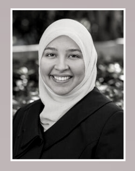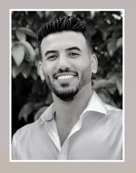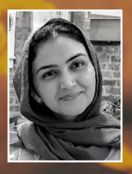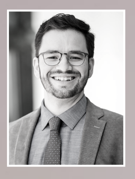Home > Supporting the Mental Health of Refugee and Asylee Communities: Speaker Lineup


Rania Awaad, MD, is a Clinical Associate Professor of Psychiatry at the Stanford University School of Medicine where she is the Director of the Stanford Muslim Mental Health & Islamic Psychology Lab, Associate Chief of the Division of Public Mental Health and Population Sciences, and Co-Chief of the Diversity and Cultural Mental Health Section. She is also the Executive Director of Maristan, a non-profit organization dedicated to reviving the Islamic heritage of holistic wellbeing. She is currently a Senior Fellow at Yaqeen Institute and ISPU. In addition, she serves as the Director of The Rahmah Foundation, a non-profit organization dedicated to educating Muslim women and girls. She has previously served as the founding Clinical Director of the Khalil Center-San Francisco as well as a Professor of Islamic Law at Zaytuna College. Prior to studying medicine, she pursued classical Islamic studies in Damascus, Syria and holds certifications (ijaza) in Qur’an, Islamic Law and other branches of the Islamic Sciences.

Hameed Makttoof, PhD Candidate, completed his undergraduate education at Seattle University where he graduated with a BA in Psychology in 2020. During his time as an undergraduate, he volunteered with Lutheran Community Service Refugee NW for 3 years, and worked with immigrant middle and high school students who came from the Middle East, Africa, and South America. Most of these students came from areas of poverty and war and had already gone through traumatic life events. Hameed worked as a teacher/mentor to help these students with their transition to the United States. He is currently a doctoral student in the counseling psychology program at the University of Illinois Urbana Champaign. Under the direction of Dr. Helen Neville, his research focuses on the mental health effects of millions of Iraqi civilians due to the United States lead invasion of Iraq in 2003. He is also interested in studying the resiliency of refugees and immigrants. Due to his experience growing up during the war in Iraq, this influenced Hameed to focus on people who have a similar background.

Annie Harper, PhD, is a cultural anthropologist working in Yale University’s Department of Psychiatry. She researches how people who have been marginalized, including people with mental illness and people with incarceration histories, cope with poverty and financial difficulties, and how to support them in this area. Her work addresses the structural determinants of mental health, with a particular focus on understanding how the financial services and retail industries could better serve low-income people generally, and people with mental illness and incarceration histories in particular. She lived in Pakistan during the 1990s, during which time she worked with Afghan refugee populations living in Pakistan, including some consulting assignments in Afghanistan. Recently, she has participated in a project with Afghan women living in New Haven who have sought asylum in the United States, using co-design methods to create a peer-based wellness intervention.

Hossna Samadi moved from Afghanistan to Connecticut with her family in 2016. She has passionately devoted the past 5 years to advocating for and serving refugees and immigrants in New Haven in many different capacities. Having experienced the challenges of being a refugee herself first hand, she is passionate about supporting, assisting and amplifying their voices, particularly Afghan women. She is a co-founder of the Collective for Refugee and Immigrant Women’s Wellbeing, a pilot project partnering with Yale to build mental health support groups for Afghan women. Hossna is an IRIS Ambassador and currently works as a program Associate At Sanctuary Kitchen.

Germán A. Cadenas, PhD, is a formerly undocumented immigrant of Latin American ancestry. He identifies as a scholar-activist who has been involved in the movement for immigrant rights for over a decade. His academic work is community-based and focuses on the psychology of immigration and on critical consciousness as a tool for social justice. He has published in outlets such as Journal of Vocational Behavior, Journal of Latinx Psychology, and Educational Researcher. His work has been externally funded and has informed policy and advocacy at the local, state, and national levels. He completed a PhD in Counseling Psychology at Arizona State University, and a Doctoral Internship and Postdoctoral Fellowship at the University of California Berkeley. He is currently an Assistant Professor of Counseling Psychology at Lehigh University, and he serves as Vice President for Diversity and Public Interest in the Society of Counseling Psychology (Division 17 of the American Psychological Association).

Kashif Ahmed, MD, is a child psychiatry fellow in his fifth year of training at the Yale Child Study Center. His clinical experiences include developing longitudinal, culturally informed mental health interventions for orphaned girls in Sri Lanka and collaborating with nonprofit organizations in New Haven, CT to provide mental health services to refugee children. After completing his training at Yale in summer 2022, he hopes to continue to be a part of culturally-relevant, sustainable mental health interventions for marginalized children, both domestically and abroad.

Kira Mauseth, PhD, is a clinical psychologist who specializes in disaster behavioral health, recovery, and resilience. She has worked extensively in the US and abroad with refugees, disaster survivors and first responders, teaches as a Senior Instructor at Seattle University and serves as a co-lead for the Behavioral Health Strike Team for the WA State Department of Health. She also owns Astrum Health, LLC, and consults with organizations and educational groups about disaster preparedness and resilience building within local communities.